Shows

EconTalkThe Problems of Boys and Men in Today's America (with Richard Reeves)Many boys and men in America are doing worse than girls and women in education while struggling with a culture that struggles to define what masculinity is in the 21st century. Is this a problem? Richard Reeves thinks so which is why he started the American Institute for Boys and Men. Listen as Reeves discusses the state of boys and men and what might be done about it with EconTalk's Russ Roberts.
2024-09-021h 13
EconTalkRichard Gunderman on Greed, Adam Smith, and Leo TolstoyPhysician and careful reader Richard Gunderman of Indiana University talks with EconTalk host Russ Roberts about how Adam Smith and Leo Tolstoy looked at greed. Drawing on Tolstoy's short story, "Master and Man," and adding some Thomas Hobbes along the way, Gunderman argues that a life well-lived requires us to rise above our lower desires. Join Gunderman and Roberts for a sleigh ride into a snowy blizzard, where you won't find your way by following rules, but rather by recognizing what needs to be seen.
2022-04-041h 05
The Tatiana Show!Free Markets, Free Minds with Gene Epstein of The Soho ForumThe Soho Forum's Gene Epstein joins Tatiana for a lively talk about about free markets and how they affect the world around us. Varying state rules on gatherings and masks, the looming COVID financial crisis, Gamestop & AMC, bitcoin investing, economic growth under Trump, and much, much more...Gene has a lot to say! Plus, hear all about the upcoming debates planned for The Soho Forum this spring in Florida! About the Guest: Gene Epstein is the former Economics and Books Editor of Barron's. He worked as a senior economist for the New York Stock Exchange. He's...
2021-03-0356 min
EconTalkRichard Davies on Extreme EconomiesEconomist and author Richard Davies talks about his book Extreme Economies with EconTalk host Russ Roberts. The conversation explores economic life in extreme situations. Examples discussed are the Angola State Penitentiary in Louisiana, two Syrian refugee camps in Jordan, the rain forest in the Darien Gap in Panama, and Kinshasa, the largest city in the Democratic Republic of Congo. This is an economic and journalistic tour de force as Davies shares insights from his encounters with people around the world struggling to trade and prosper in extreme environments.
2020-03-092h 04
EconTalkRichard Robb on WillfulEconomist, author, and investor Richard Robb talks about his book Willful with EconTalk host Russ Roberts. Robb is interested in what motivates and explains the choices we make. He explores alternatives to the optimizing model of economics including what he calls "for-itself" behavior--behavior that isn't purposive. Topics discussed in this wide-ranging conversation include the nature of work, decision-making under uncertainty, the Joseph story in the Book of Genesis, Nietzsche, the Financial Crisis of 2008, altruism, and how green beans are sold.
2020-02-241h 31
EconTalkRichard Reinsch on the Enlightenment, Tradition, and PopulismRichard Reinsch, editor of Law and Liberty and the host of the podcast Liberty Law Talk, talks with EconTalk host Russ Roberts about the Enlightenment. Topics discussed include the search for meaning, the stability of liberalism, the rise of populism, and Solzhenitsyn's indictment of Western values from his Harvard Commencement Address of 1978.
2018-06-181h 06
Economics Detective RadioEconTalk, Intellectual Honesty, and Adam Smith with Russ RobertsToday's guest is Russ Roberts, host of the quintessential economics podcast EconTalk. (If you haven't heard EconTalk, go subscribe to it right now, because it is excellent!) We discuss EconTalk's role in the economics profession, the things Russ has learned in the course of making it, the importance of intellectual honesty, and the enduring insights of Adam Smith. Here's the EconTalk interview with Bryan Caplan that I mentioned in the episode. Stay tuned for my own interview with Bryan! "The first principle is that you must not fool yourself---and you are the easiest person to fool."...
2018-02-2349 min
Economics Detective RadioEconTalk, Intellectual Honesty, and Adam Smith with Russ Roberts Today's guest is Russ Roberts, host of the quintessential economics podcast EconTalk. (If you haven't heard EconTalk, go subscribe to it right now, because it is excellent!) We discuss EconTalk's role in the economics profession, the things Russ has learned in the course of making it, the importance of intellectual honesty, and the enduring insights of Adam Smith. Here's the EconTalk interview with Bryan Caplan that I mentioned in the episode. Stay tuned for my own interview with Bryan! "The first principle is that you must not fool yourself---and you are the easiest...
2018-02-2349 min
EconTalkRichard Epstein on Cruises, First-Class Travel, and InequalityHow should we feel about cruise lines that offer special amenities for top-paying travelers, or first-class sections of airplanes? Do such consumption inequalities harm the social fabric or is there more to the story? Richard Epstein of New York University and the Hoover Institution talks with EconTalk host Russ Roberts about these issues arguing that these kinds of unequal treatment provide benefits beyond those who receive the top-of-the-line option. The conversation then moves on to a general discussion of inequality, taxation, and redistribution.
2016-06-271h 03
EconTalkRichard Jones on TranshumanismWill our brains ever be uploaded into a computer? Will we live forever? Richard Jones, physicist at the University of Sheffield and author of Against Transhumanism, talks with EconTalk host Russ Roberts about transhumanism--the effort to radically transform human existence via technology. Jones argues that the grandest visions of the potential of technology--uploading of brains and the ability to rearrange matter via nanotechnology are much more limited and unlikely than proponents of these technologies suggest. The conversation closes with the role of government in innovation and developing technology.
2016-04-041h 11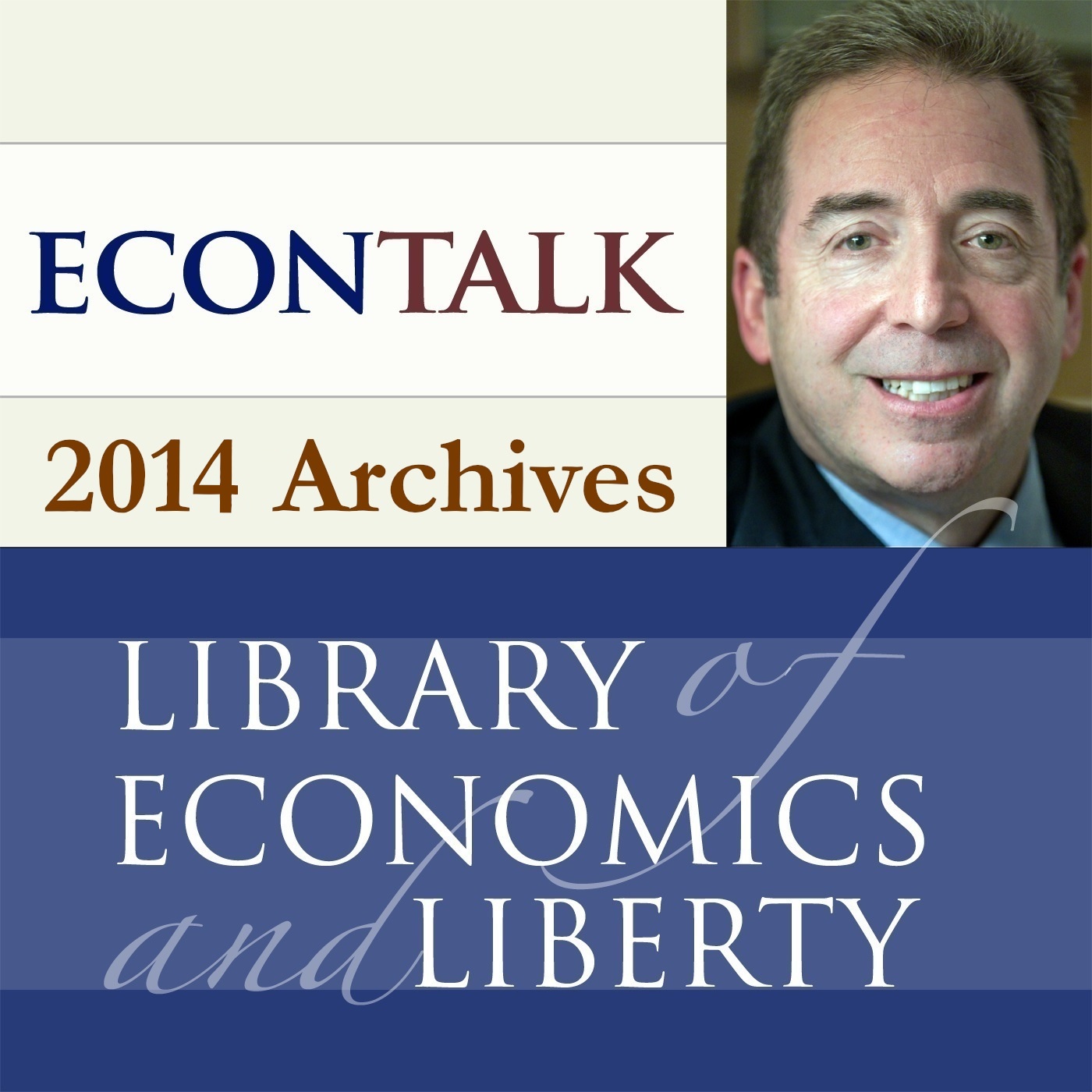
EconTalk Archives, 2014Richard Epstein on Classical Liberalism, Libertarianism, and LochnerRichard Epstein, of New York University and Stanford University's Hoover Institution, talks with EconTalk host Russ Roberts about the differences between classical liberalism and hard-line libertarianism. What is the proper role of the state? Topics discussed include the Constitution, prudent regulation, contract enforcement, intellectual property, and the Supreme Court case, Lochner vs. NY.
2014-03-1000 min
EconTalkRichard Epstein on Classical Liberalism, Libertarianism, and LochnerRichard Epstein, of New York University and Stanford University's Hoover Institution, talks with EconTalk host Russ Roberts about the differences between classical liberalism and hard-line libertarianism. What is the proper role of the state? Topics discussed include the Constitution, prudent regulation, contract enforcement, intellectual property, and the Supreme Court case, Lochner vs. NY.
2014-03-101h 08
EconTalk Archives, 2013Richard Fisher on Too Big to Fail and the FedRichard Fisher, President of the Federal Reserve Bank of Dallas, talks with EconTalk host Russ Roberts about the problems with "too big to fail"--the policy idea that certain financial institutions are too large to face the bankruptcy or failure and need to be rescued or bailed-out. Fisher argues that "too big to fail" remains a serious problem despite claims that recent financial regulation has eliminated it. Fisher discusses various ways to deal with too-big-to-fail, including his own preferred policy. The last part of the conversation deals with quantitative easing and monetary policy during the crisis.
2013-12-3000 min
EconTalkRichard Fisher on Too Big to Fail and the FedRichard Fisher, President of the Federal Reserve Bank of Dallas, talks with EconTalk host Russ Roberts about the problems with "too big to fail"--the policy idea that certain financial institutions are too large to face the bankruptcy or failure and need to be rescued or bailed-out. Fisher argues that "too big to fail" remains a serious problem despite claims that recent financial regulation has eliminated it. Fisher discusses various ways to deal with too-big-to-fail, including his own preferred policy. The last part of the conversation deals with quantitative easing and monetary policy during the crisis.
2013-12-301h 00
EconTalk Archives, 2013Capitalism, Government, and the Good SocietyOn April 10, 2013, Liberty Fund and Butler University sponsored a symposium, "Capitalism, Government, and the Good Society." The evening began with solo presentations by the three participants--Michael Munger of Duke University, Robert Skidelsky of the University of Warwick, and Richard Epstein of New York University. (Travel complications forced the fourth invited participant, James Galbraith of the University of Texas, to cancel.) Each speaker gave his own interpretation of the appropriate role for government in the economy and in our lives. This was followed by a lively conversation on the topic moderated by Russ Roberts of Stanford University, host of the weekly...
2013-09-0400 min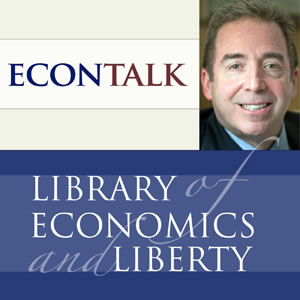
EconTalk at GMUCapitalism, Government, and the Good SocietyOn April 10, 2013, Liberty Fund and Butler University sponsored a symposium, "Capitalism, Government, and the Good Society." The evening began with solo presentations by the three participants--Michael Munger of Duke University, Robert Skidelsky of the University of Warwick, and Richard Epstein of New York University. (Travel complications forced the fourth invited participant, James Galbraith of the University of Texas, to cancel.) Each speaker gave his own interpretation of the appropriate role for government in the economy and in our lives. This was followed by a lively conversation on the topic moderated by Russ Roberts of Stanford University, host of the weekly...
2013-09-041h 58
EconTalkCapitalism, Government, and the Good SocietyOn April 10, 2013, Liberty Fund and Butler University sponsored a symposium, "Capitalism, Government, and the Good Society." The evening began with solo presentations by the three participants--Michael Munger of Duke University, Robert Skidelsky of the University of Warwick, and Richard Epstein of New York University. (Travel complications forced the fourth invited participant, James Galbraith of the University of Texas, to cancel.) Each speaker gave his own interpretation of the appropriate role for government in the economy and in our lives. This was followed by a lively conversation on the topic moderated by Russ Roberts of Stanford University, host of the...
2013-09-041h 58
EconTalk at GMUEpstein on the ConstitutionRichard Epstein of New York University and Stanford University's Hoover Institution talks with EconTalk host Russ Roberts about the U.S. Constitution. Topics covered in this wide-ranging conversation include how the interpretation of the Constitution has changed over time, the relationship between state and federal power, judicial activism, the increasing importance of administrative agencies' regulatory power, and political influences on the Supreme Court.
2013-05-201h 02
EconTalk Archives, 2013Epstein on the ConstitutionRichard Epstein of New York University and Stanford University's Hoover Institution talks with EconTalk host Russ Roberts about the U.S. Constitution. Topics covered in this wide-ranging conversation include how the interpretation of the Constitution has changed over time, the relationship between state and federal power, judicial activism, the increasing importance of administrative agencies' regulatory power, and political influences on the Supreme Court.
2013-05-2000 min
EconTalkRichard Epstein on the ConstitutionRichard Epstein of New York University and Stanford University's Hoover Institution talks with EconTalk host Russ Roberts about the U.S. Constitution. Topics covered in this wide-ranging conversation include how the interpretation of the Constitution has changed over time, the relationship between state and federal power, judicial activism, the increasing importance of administrative agencies' regulatory power, and political influences on the Supreme Court.
2013-05-201h 02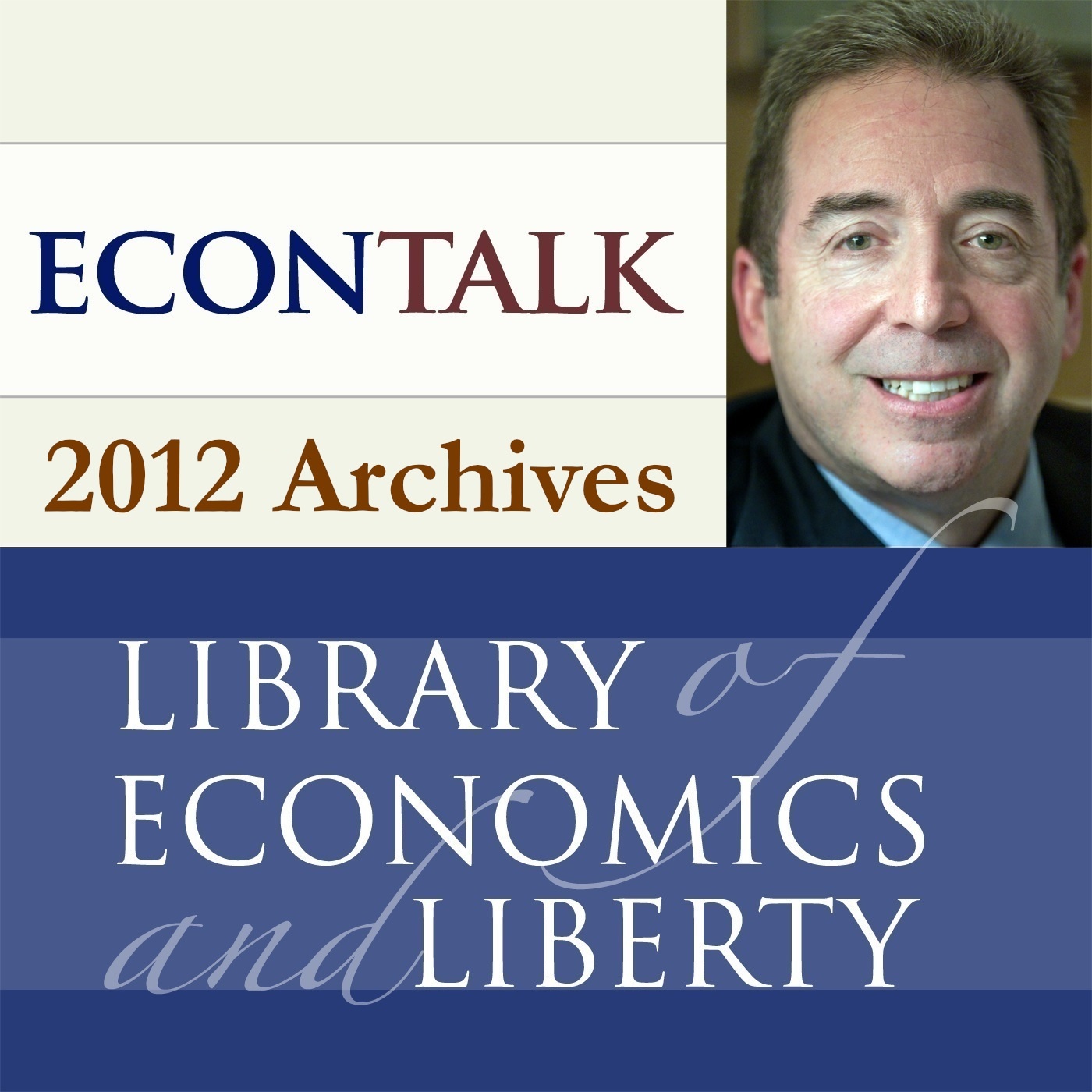
EconTalk Archives, 2012Burkhauser on the Middle ClassRichard Burkhauser of Cornell University talks with EconTalk host Russ Roberts about the state of the middle class. Drawing on recently published papers, Burkhauser shows that changes in the standard of living of the middle class and other parts of the income distribution are extremely sensitive to various assumptions about how income is defined as well as whether you look at tax units or households. He shows that under one set of assumptions, there has been no change in median income, but under a different and equally reasonable set of assumptions, median income has grown 36%. Burkhauser explains how different assumptions...
2012-04-091h 09
EconTalkRichard Burkhauser on the Middle ClassRichard Burkhauser of Cornell University talks with EconTalk host Russ Roberts about the state of the middle class. Drawing on recently published papers, Burkhauser shows that changes in the standard of living of the middle class and other parts of the income distribution are extremely sensitive to various assumptions about how income is defined as well as whether you look at tax units or households. He shows that under one set of assumptions, there has been no change in median income, but under a different and equally reasonable set of assumptions, median income has grown 36%. Burkhauser explains how different...
2012-04-091h 09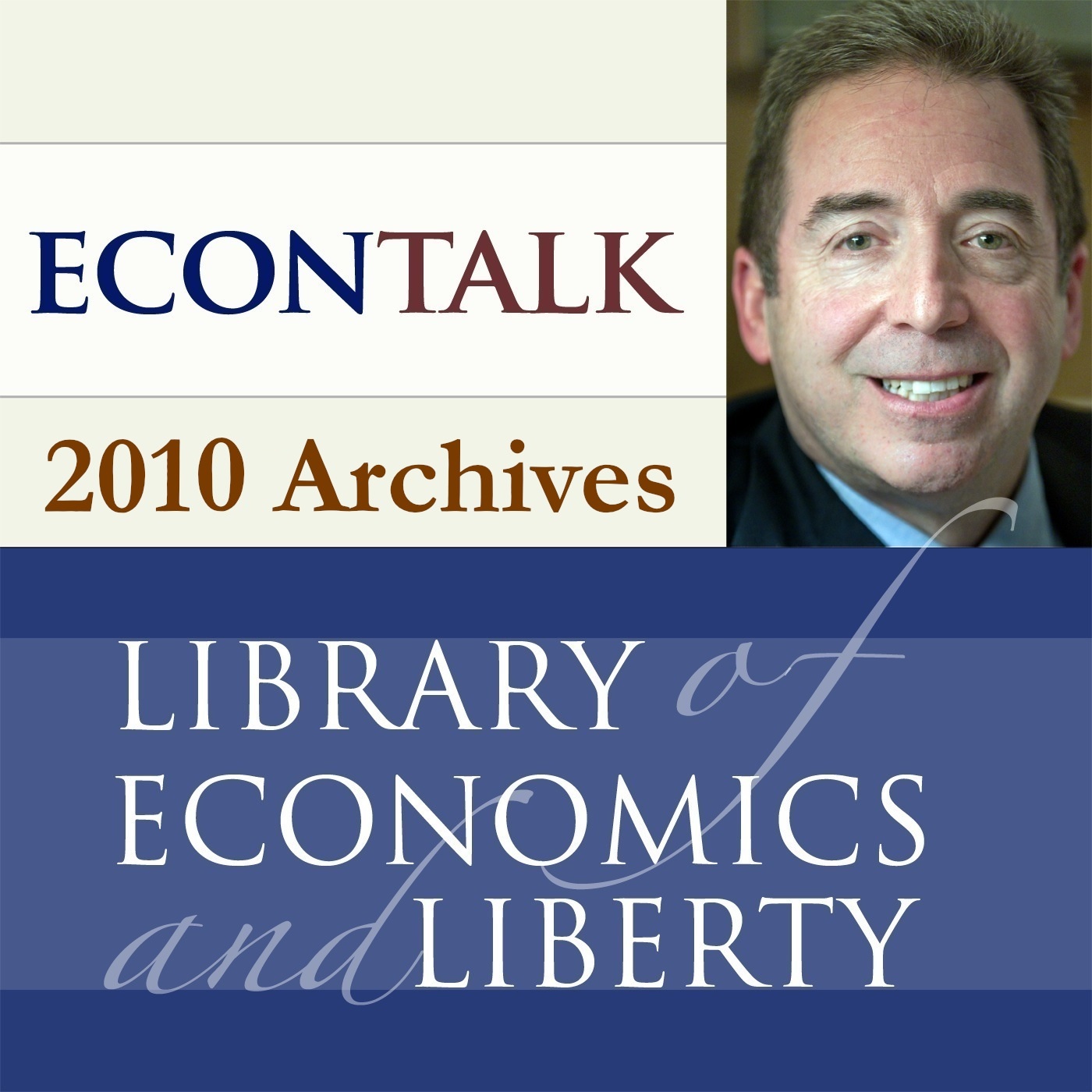
EconTalk Archives, 2010Richard Epstein on RegulationRichard Epstein of New York University and Stanford University's Hoover Institution talks with EconTalk host Russ Roberts about the current state of the economy, particularly the regulatory climate. Epstein argues the current level of regulation is producing unusually high costs. He digs more deeply into the pharmaceutical industry and discusses various regulations and alternative ways to encourage drug safety and innovation.
2010-09-2000 min
EconTalkRichard Epstein on RegulationRichard Epstein of New York University and Stanford University's Hoover Institution talks with EconTalk host Russ Roberts about the current state of the economy, particularly the regulatory climate. Epstein argues the current level of regulation is producing unusually high costs. He digs more deeply into the pharmaceutical industry and discusses various regulations and alternative ways to encourage drug safety and innovation.
2010-09-201h 07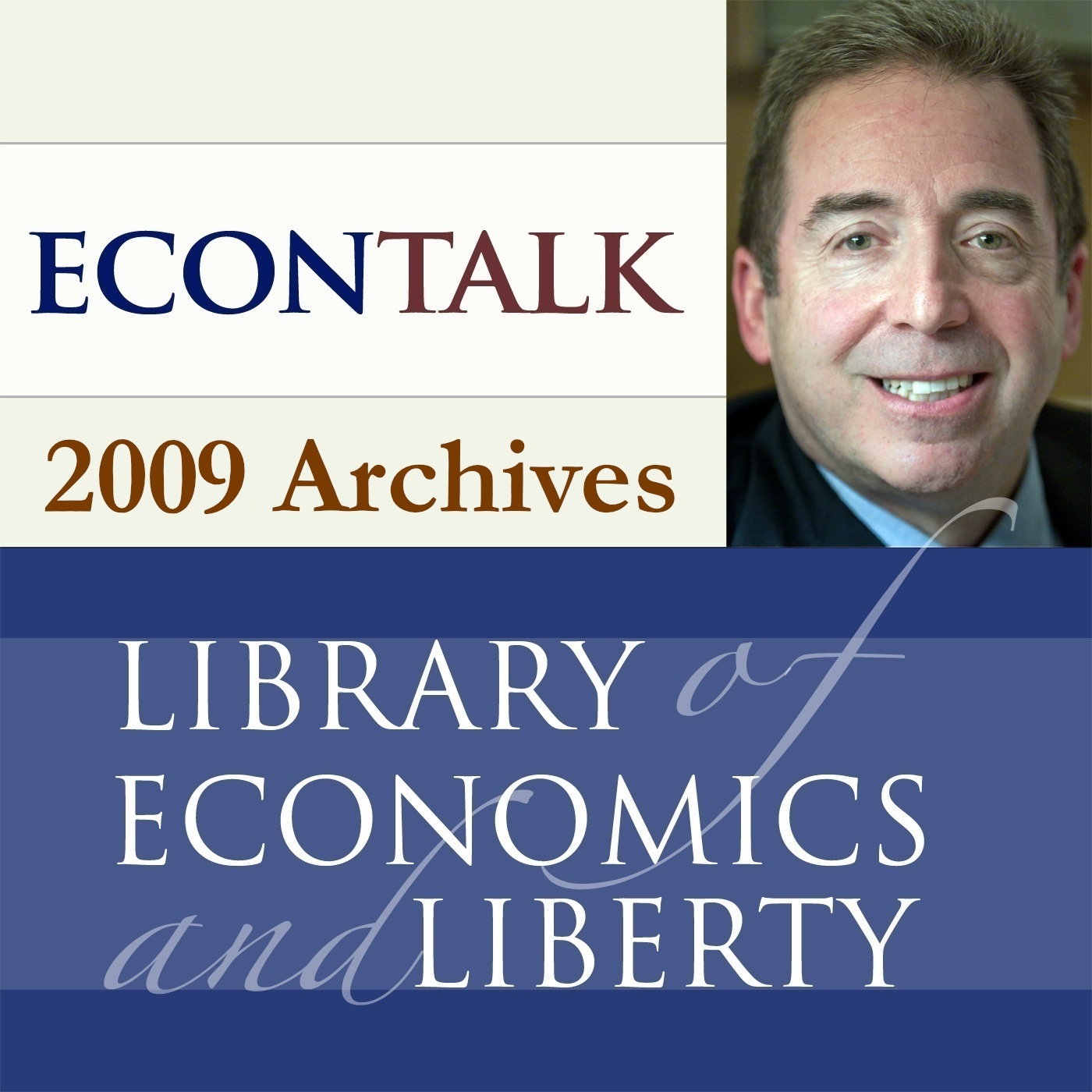
EconTalk Archives, 2009Posner on the Financial CrisisRichard Posner, federal judge and prolific author, discusses the financial crisis with EconTalk host Russ Roberts. Posner (despite the title of his recent book on the crisis, A Failure of Capitalism) places most of the blame for the crisis on the Federal Reserve, inattentive regulators and the subsidization of risk. He also criticizes economists for complacency in the face of impending disaster. A recent convert of sorts to Keynesianism, Posner confesses some disillusion with the implementation of the stimulus plan and the expanding role of the Federal government.
2009-11-1600 min
Rob Wiblin's top recommended EconTalk episodes v0.2 Feb 2020Posner on the Financial CrisisRichard Posner, federal judge and prolific author, discusses the financial crisis with EconTalk host Russ Roberts. Posner (despite the title of his recent book on the crisis, A Failure of Capitalism) places most of the blame for the crisis on the Federal Reserve, inattentive regulators and the subsidization of risk. He also criticizes economists for complacency in the face of impending disaster. A recent convert of sorts to Keynesianism, Posner confesses some disillusion with the implementation of the stimulus plan and the expanding role of the Federal government.
2009-11-161h 03
EconTalkRichard Posner on the Financial CrisisRichard Posner, federal judge and prolific author, discusses the financial crisis with EconTalk host Russ Roberts. Posner (despite the title of his recent book on the crisis, A Failure of Capitalism) places most of the blame for the crisis on the Federal Reserve, inattentive regulators and the subsidization of risk. He also criticizes economists for complacency in the face of impending disaster. A recent convert of sorts to Keynesianism, Posner confesses some disillusion with the implementation of the stimulus plan and the expanding role of the Federal government.
2009-11-161h 03
EconTalk Archives, 2009Epstein on the Rule of LawRichard Epstein of the University of Chicago and Stanford University's Hoover Institution talks with EconTalk host Russ Roberts about the rule of law. Epstein lays out a minimalist definition and a more expansive definition when considering the protection that individuals might have when facing the power of the state or the sovereign. Applications include "takings" and the current government interventions in the auto industry and the financial sector.
2009-06-0100 min
EconTalkRichard Epstein on the Rule of LawRichard Epstein of the University of Chicago and Stanford University's Hoover Institution talks with EconTalk host Russ Roberts about the rule of law. Epstein lays out a minimalist definition and a more expansive definition when considering the protection that individuals might have when facing the power of the state or the sovereign. Applications include "takings" and the current government interventions in the auto industry and the financial sector.
2009-06-011h 06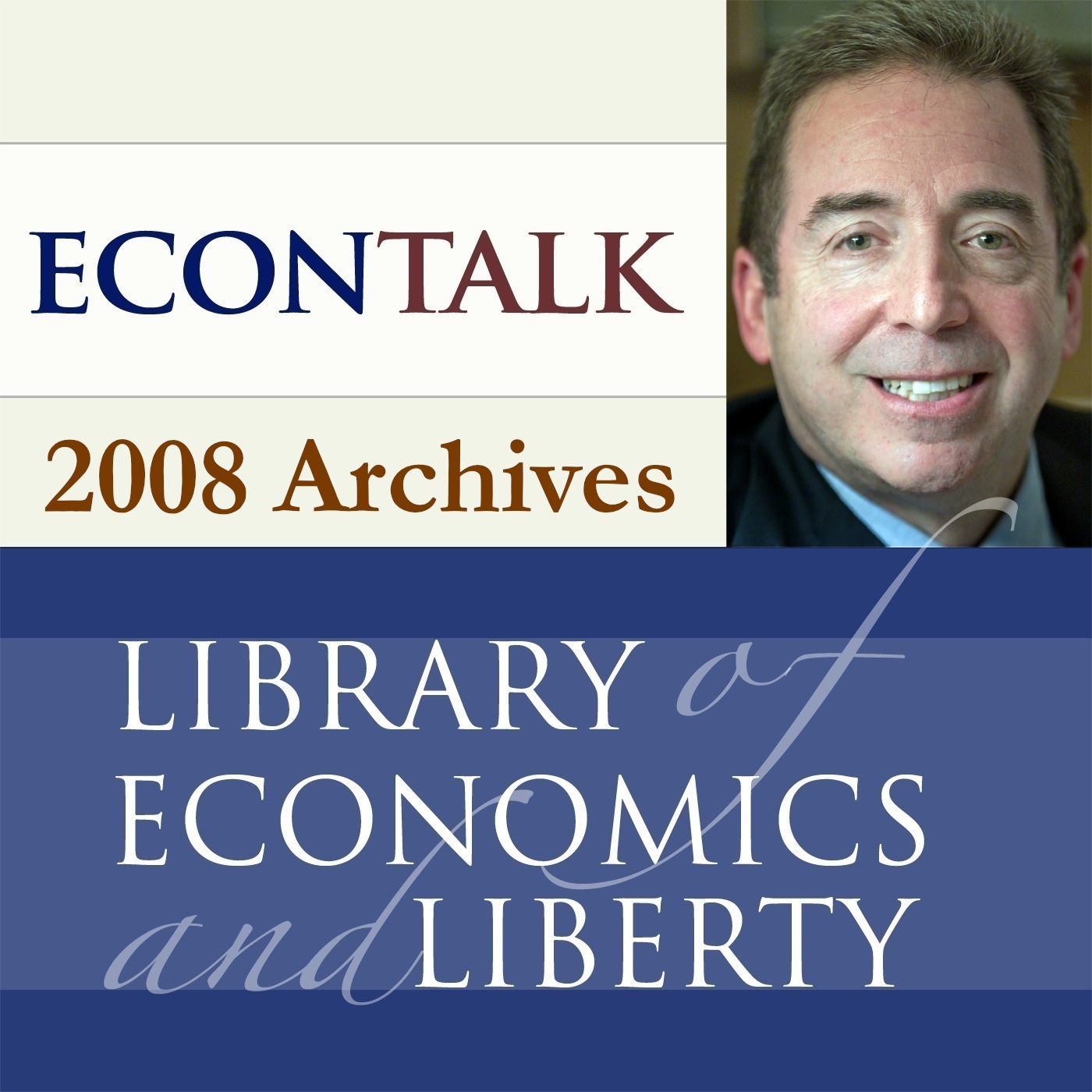
EconTalk Archives, 2008Richard Epstein on Happiness, Inequality, and EnvyRichard Epstein of the University of Chicago talks with EconTalk host Russ Roberts about the relationship between happiness and wealth, the effects of inequality on happiness, and the economics of envy and altruism. He also applies the theory of evolution to explain some of the findings of the happiness literature.
2008-11-0356 min
EconTalkRichard Epstein on Happiness, Inequality, and EnvyRichard Epstein of the University of Chicago talks with EconTalk host Russ Roberts about the relationship between happiness and wealth, the effects of inequality on happiness, and the economics of envy and altruism. He also applies the theory of evolution to explain some of the findings of the happiness literature.
2008-11-0356 min
EconTalk Archives, 2008McKenzie on PricesRichard McKenzie of the University California, Irvine and the author of Why Popcorn Costs So Much at the Movies and Other Pricing Puzzles, talks with EconTalk host Russ Roberts about a wide range of pricing puzzles. They discuss why Southern California experiences frequent water crises, why price falls after Christmas, why popcorn seems so expensive at the movies, and the economics of price discrimination.
2008-06-231h 15
EconTalkRichard McKenzie on PricesRichard McKenzie of the University California, Irvine and the author of Why Popcorn Costs So Much at the Movies and Other Pricing Puzzles, talks with EconTalk host Russ Roberts about a wide range of pricing puzzles. They discuss why Southern California experiences frequent water crises, why price falls after Christmas, why popcorn seems so expensive at the movies, and the economics of price discrimination.
2008-06-231h 15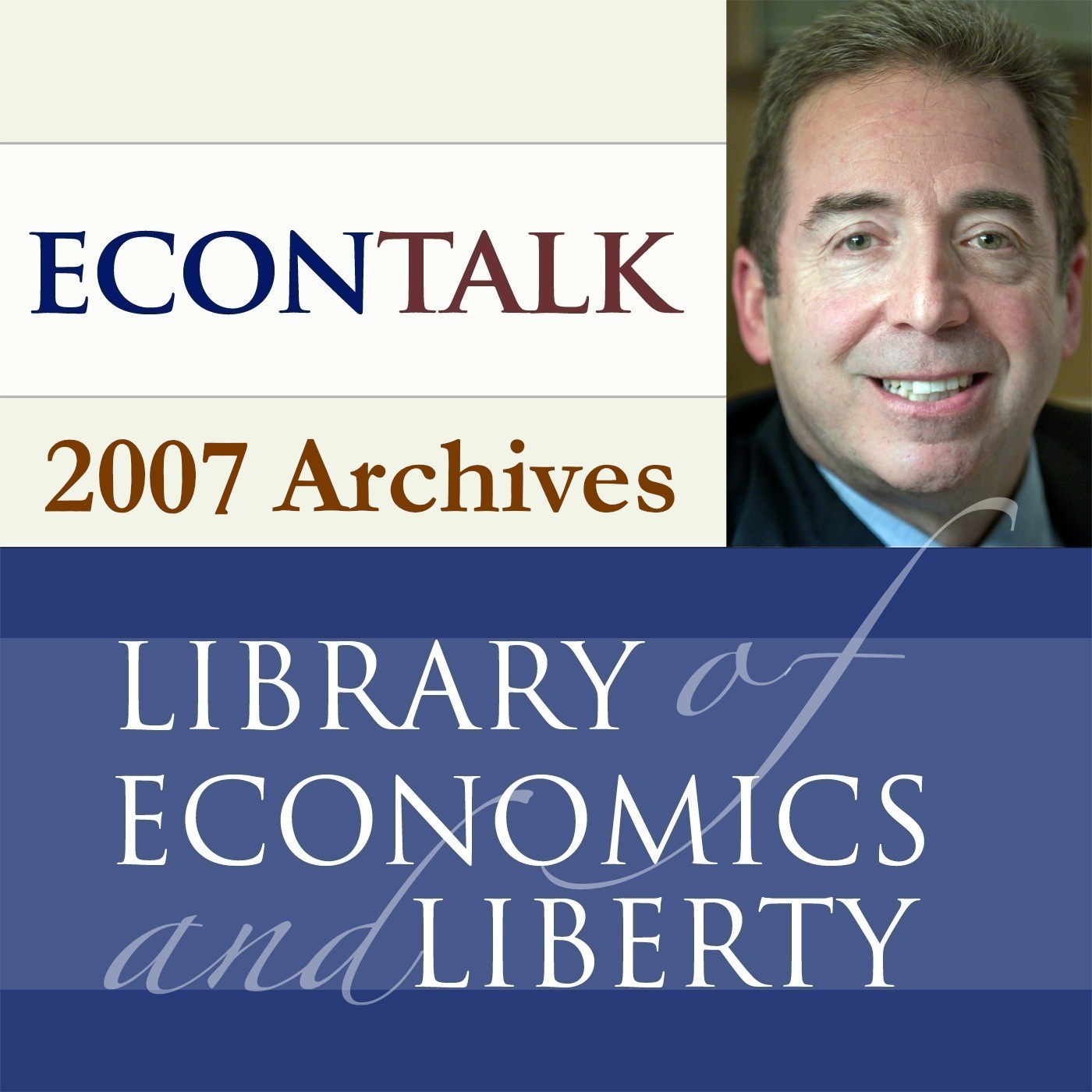
EconTalk Archives, 2007Epstein on Property Rights, Zoning and KeloRichard Epstein, of the University of Chicago and Stanford's Hoover Institution, makes the case that many current zoning restrictions are essentially "takings" and property owners should receive compensation for the lost value of their land. He also discusses the Kelo case and the political economy of the regulation of land.
2007-09-1700 min
EconTalk Archives, 2007Richard Epstein on Property Rights and Drug PatentsRichard Epstein of the University of Chicago and Stanford University's Hoover Institution talks about property rights, drug patents, the FDA, and the ideas in his latest book, Overdose: How Excessive Government Regulation Stifles Pharmaceutical Innovation from Yale University Press.
2007-02-1900 min
Rob Wiblin's top recommended EconTalk episodes v0.2 Feb 2020Richard Thaler on Libertarian PaternalismRichard Thaler of the U. of Chicago Graduate School of Business defends the idea of libertarian paternalism--how government might use the insights of behavioral economics to help citizens make better choices. Host Russ Roberts accepts the premise that individuals make imperfect choices but challenges Thaler on the likelihood that government, in practice, will improve matters. Along the way they discuss the design of Sweden's social security system, organ donations and whether professors at Cornell University are more or less like you and me.
2006-11-061h 02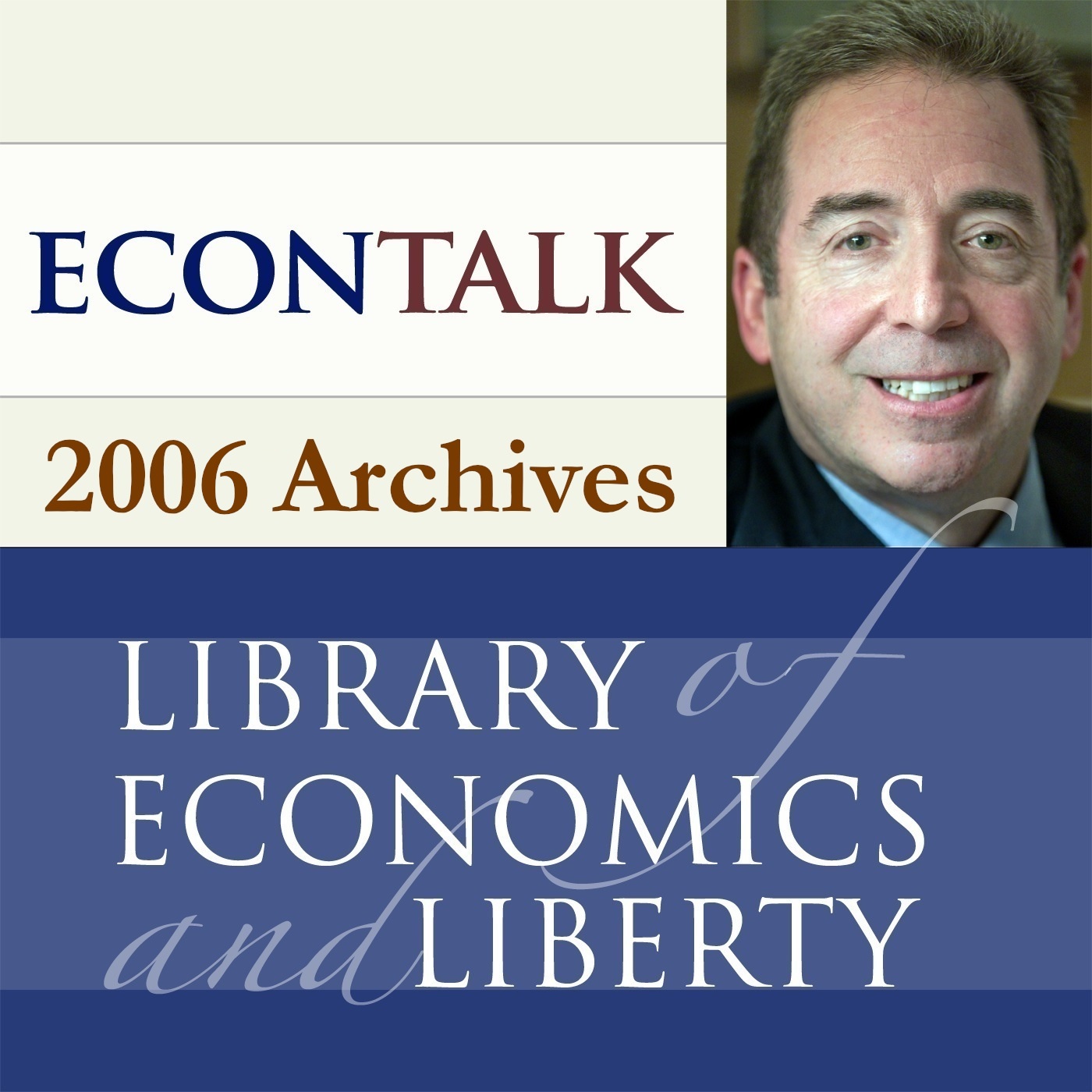
EconTalk Archives, 2006Richard Thaler on Libertarian PaternalismRichard Thaler of the U. of Chicago Graduate School of Business defends the idea of libertarian paternalism--how government might use the insights of behavioral economics to help citizens make better choices. Host Russ Roberts accepts the premise that individuals make imperfect choices but challenges Thaler on the likelihood that government, in practice, will improve matters. Along the way they discuss the design of Sweden's social security system, organ donations and whether professors at Cornell University are more or less like you and me.
2006-11-061h 02
EconTalk Archives, 2006Legislators vs. Wal-MartRuss Roberts and Richard Epstein discuss the attempts to use legislation to handicap Wal-Mart. They also discuss the evolution of the union movement and the constitutionality of various legislative attacks on Wal-Mart.
2006-09-1144 min
EconTalk Archives, 2006The Economics of Organ DonationRichard Epstein, law professor at the University of Chicago, and Russ Roberts discuss the market for kidneys. Should people be allowed to buy and sell kidneys? How might a market for kidneys actually work in practice? Should mercenary motives be allowed to trump altruism? Epstein deals with these questions and more.
2006-06-0539 min
Rob Wiblin's top recommended EconTalk episodes v0.2 Feb 2020The Economics of Organ DonationRichard Epstein, law professor at the University of Chicago, and Russ Roberts discuss the market for kidneys. Should people be allowed to buy and sell kidneys? How might a market for kidneys actually work in practice? Should mercenary motives be allowed to trump altruism? Epstein deals with these questions and more.
2006-06-0539 min